专八翻译
专八英译汉段落翻译_中英文对照
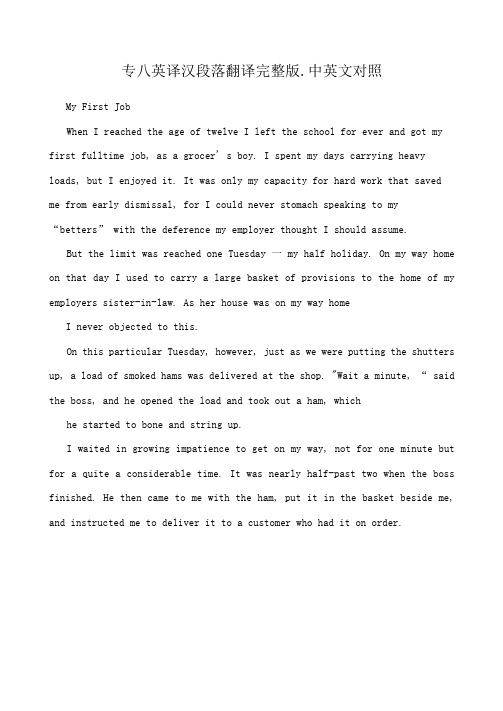
专八英译汉段落翻译完整版.中英文对照My First JobWhen I reached the age of twelve I left the school for ever and got my first fulltime job, as a grocer' s boy. I spent my days carrying heavy loads, but I enjoyed it. It was only my capacity for hard work that saved me from early dismissal, for I could never stomach speaking to my “betters” with the deference my employer thought I should assume.But the limit was reached one Tuesday 一 my half holiday. On my way home on that day I used to carry a large basket of provisions to the home of my employers sister-in-law. As her house was on my way homeI never objected to this.On this particular Tuesday, however, just as we were putting the shutters up, a load of smoked hams was delivered at the shop. "Wait a minute, “ said the boss, and he opened the load and took out a ham, whichhe started to bone and string up.I waited in growing impatience to get on my way, not for one minute but for a quite a considerable time. It was nearly half-past two when the boss finished. He then came to me with the ham, put it in the basket beside me, and instructed me to deliver it to a customer who had it on order.This meant going a long way out of my road home, so I looked up andsaid to the boss: "Do you know I finish at two on Tuesday?I have never seen a man look more astonished than he did then. u What do you mean?n he gasped. I told him I meant that I would deliver the groceries as usual, but not the ham.He looked at me as if I were some unusual kind f insect and burst into a storm of abuse. But I stood firm. He gave me up as hopeless and tried new tactics. "Go out and get another boy, “ he yelled at a shop assistant.u Are you going to deliver them or not?” the boss turned to me and asked in a threatening tone. I repeated what I had said before. "Then, out of here, “ he shouted. So I got out.This was the first time I had serious trouble with an employer.1我的第一份工作当我十二岁时我永远地离开了学校,同时得到了我的第一份全职工作,作为一个食品杂货商的见孩。
专八翻译真题及参考答案
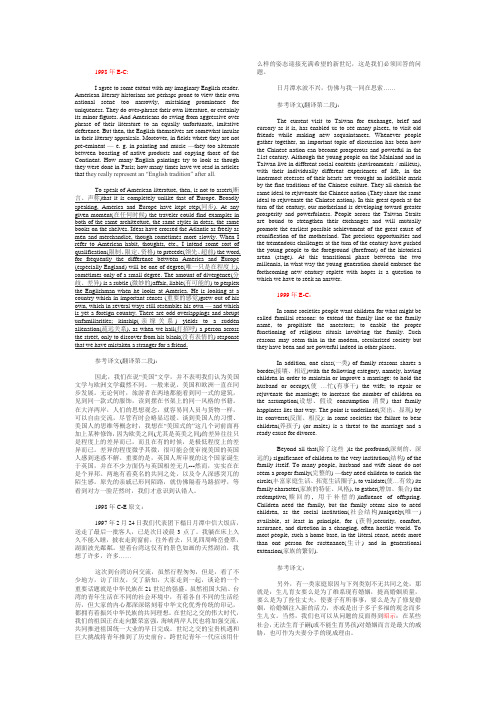
1998年E-C:I agree to some extent with my imaginary English reader. American literary historians are perhaps prone to view their own national scene too narrowly, mistaking prominence for uniqueness. They do over-phrase their own literature, or certainly its minor figures. And Americans do swing from aggressive over phrase of their literature to an equally unfortunate, imitative deference. But then, the English themselves are somewhat insular in their literary appraisals. Moreover, in fields where they are not pre-eminent — e. g. in painting and music —they too alternate between boasting of native products and copying those of the Continent. How many English paintings try to look as though they were done in Paris; how many times have we read in articles that t hey really represent an ―English tradition‖ after all.To speak of American literature, then, is not to assert(断言、声称)that it is completely unlike that of Europe. Broadly speaking, America and Europe have kept step(同步). At any given moment(在任何时候) the traveler could find examples in both of the same architecture, the same styles in dress, the same books on the shelves. Ideas have crossed the Atlantic as freely as men and merchandise, though sometimes more slowly. When I refer to American habit, thoughts, etc., I intend some sort of qualification(限制、限定、资格) to precede(领先、超前) the word, for frequently the difference between America and Europe (especially England) will be one of degree(唯一只是在程度上), sometimes only of a small degree. The amount of divergence(分歧、差异) is a subtle (微妙的)affair, liable(有可能的) to perplex the Englishman when he looks at America. He is looking at a country which in important senses (重要的感觉)grew out of his own, which in several ways still resembles his own — and which is yet a foreign country. There are odd overlappings and abrupt unfamiliarities; kinship(亲缘关系) yields to a sudden alienation(疏远关系), as when we hail(打招呼) a person across the street, only to discover from his blank(没有表情的) response that we have mistaken a stranger for a friend.参考译文(翻译第二段):因此,我们在说―美国‖文学,并不表明我们认为美国文学与欧洲文学截然不同。
专八经典翻译
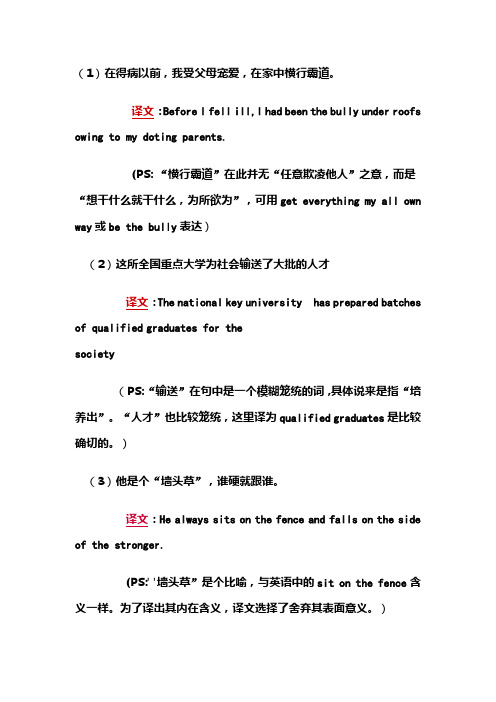
(1)在得病以前,我受父母宠爱,在家中横行霸道。
译文:Before I fell ill,I had been the bully under roofs owing to my doting parents.(PS: “横行霸道”在此并无“任意欺凌他人”之意,而是“想干什么就干什么,为所欲为”,可用get everything my all own way或be the bully表达)(2)这所全国重点大学为社会输送了大批的人才译文:The national key university has prepared batches of qualified graduates for the society(PS:“输送”在句中是一个模糊笼统的词,具体说来是指“培养出”。
“人才”也比较笼统,这里译为qualified graduates是比较确切的。
)(3)他是个“墙头草”,谁硬就跟谁。
译文:He always sits on the fence and falls on the side of the stronger.(PS: "墙头草”是个比喻,与英语中的sit on the fence含义一样。
为了译出其内在含义,译文选择了舍弃其表面意义。
)(4)这样,每个地方都有自己的传说,风俗也就衍传了下来。
译文:Thus,every place,with its own legends and tales,has its traditions and customs passed on from generation to generation.(PS: 汉译英时,汉语中有些动词都可以用介词短语来表达,这样更形象。
)(5)面对一池碧水,将忧心烦恼全都抛在一边,使自己的身心得以充分休息。
译文:When facing a pool of green water,you forget all your worries and annoyance and enjoy a good rest,both mentally and physically.(PS: 英语代词比汉语代词种类多,用法更别多,汉译英时,注意增译出其隐含在句中的代词。
专四专八文言文翻译
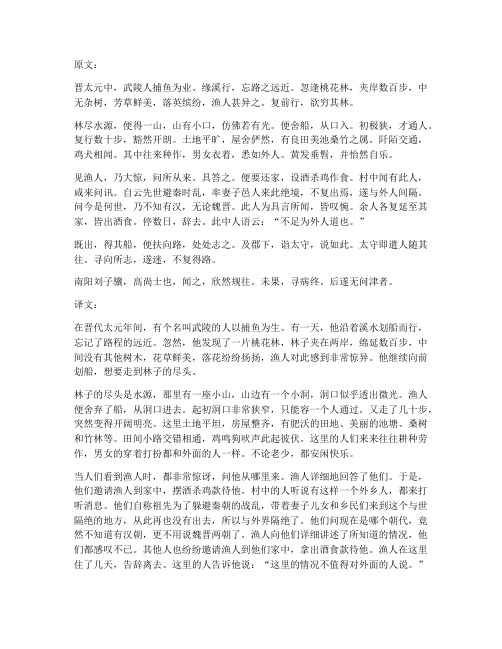
原文:晋太元中,武陵人捕鱼为业。
缘溪行,忘路之远近。
忽逢桃花林,夹岸数百步,中无杂树,芳草鲜美,落英缤纷,渔人甚异之。
复前行,欲穷其林。
林尽水源,便得一山,山有小口,仿佛若有光。
便舍船,从口入。
初极狭,才通人。
复行数十步,豁然开朗。
土地平旷,屋舍俨然,有良田美池桑竹之属。
阡陌交通,鸡犬相闻。
其中往来种作,男女衣着,悉如外人。
黄发垂髫,并怡然自乐。
见渔人,乃大惊,问所从来。
具答之。
便要还家,设酒杀鸡作食。
村中闻有此人,咸来问讯。
自云先世避秦时乱,率妻子邑人来此绝境,不复出焉,遂与外人间隔。
问今是何世,乃不知有汉,无论魏晋。
此人为具言所闻,皆叹惋。
余人各复延至其家,皆出酒食。
停数日,辞去。
此中人语云:“不足为外人道也。
”既出,得其船,便扶向路,处处志之。
及郡下,诣太守,说如此。
太守即遣人随其往。
寻向所志,遂迷,不复得路。
南阳刘子骥,高尚士也,闻之,欣然规往。
未果,寻病终。
后遂无问津者。
译文:在晋代太元年间,有个名叫武陵的人以捕鱼为生。
有一天,他沿着溪水划船而行,忘记了路程的远近。
忽然,他发现了一片桃花林,林子夹在两岸,绵延数百步,中间没有其他树木,花草鲜美,落花纷纷扬扬,渔人对此感到非常惊异。
他继续向前划船,想要走到林子的尽头。
林子的尽头是水源,那里有一座小山,山边有一个小洞,洞口似乎透出微光。
渔人便舍弃了船,从洞口进去。
起初洞口非常狭窄,只能容一个人通过。
又走了几十步,突然变得开阔明亮。
这里土地平坦,房屋整齐,有肥沃的田地、美丽的池塘、桑树和竹林等。
田间小路交错相通,鸡鸣狗吠声此起彼伏。
这里的人们来来往往耕种劳作,男女的穿着打扮都和外面的人一样。
不论老少,都安闲快乐。
当人们看到渔人时,都非常惊讶,问他从哪里来。
渔人详细地回答了他们。
于是,他们邀请渔人到家中,摆酒杀鸡款待他。
村中的人听说有这样一个外乡人,都来打听消息。
他们自称祖先为了躲避秦朝的战乱,带着妻子儿女和乡民们来到这个与世隔绝的地方,从此再也没有出去,所以与外界隔绝了。
精彩专八汉译英翻译
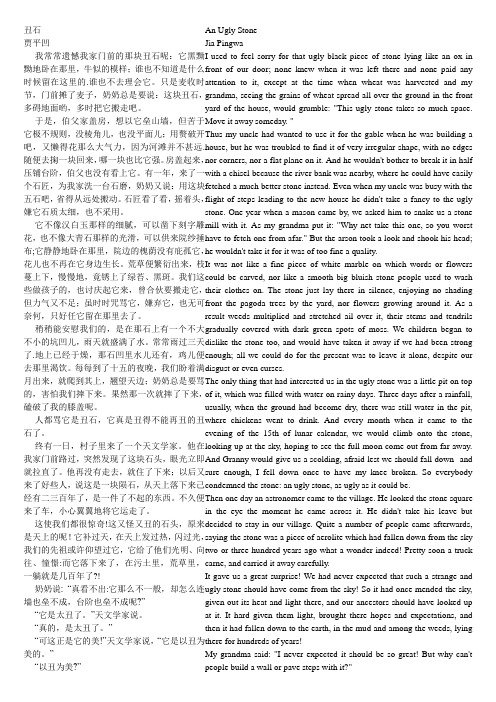
丑石贾平凹我常常遗憾我家门前的那块丑石呢:它黑黝黝地卧在那里,牛似的模样;谁也不知道是什么时候留在这里的.谁也不去理会它。
只是麦收时节,门前摊了麦子,奶奶总是要说:这块丑石,多碍地面哟,多时把它搬走吧。
于是,伯父家盖房,想以它垒山墙,但苦于它极不规则,没棱角儿,也没平面儿;用赘破开吧,又懒得花那么大气力,因为河滩并不甚远.随便去掬一块回来,哪一块也比它强。
房盖起来,压铺台阶,伯父也没有看上它。
有一年,来了一个石匠,为我家洗一台石磨,奶奶又说:用这块五石吧,省得从远处搬动。
石匠看了看,摇着头,嫌它石质太细,也不采用。
它不像汉白玉那样的细腻,可以凿下刻字雕花,也不像大青石那样的光滑,可以供来院纱捶布;它静静地卧在那里,院边的槐荫没有庇孤它,花儿也不再在它身边生长。
荒草便繁衍出来,枝蔓上下,慢慢地,竟锈上了绿苔、黑斑。
我们这些做孩子的,也讨庆起它来,曾合伙要搬走它,但力气又不足;虽时时咒骂它,嫌弃它,也无可奈何,只好任它留在那里去了。
稍稍能安慰我们的,是在那石上有一个不大不小的坑凹儿,雨天就盛满了水。
常常雨过三天了.地上已经于燥,那石凹里水儿还有,鸡儿便去那里渴饮。
每每到了十五的夜晚,我们盼着满月出来,就爬到其上,翘望天边;奶奶总是要骂的,害怕我们摔下来。
果然那一次就摔了下来,磕破了我的膝盖呢。
人都骂它是丑石,它真是丑得不能再丑的丑石了。
终有一日,村子里来了一个天文学家。
他在我家门前路过,突然发现了这块石头,眼光立即就拉直了。
他再没有走去,就住了下来;以后又来了好些人,说这是一块陨石,从天上落下来己经有二三百年了,是一件了不起的东西。
不久便来了车,小心翼翼地将它运走了。
这使我们都很惊奇!这又怪又丑的石头,原来是天上的呢!它补过天,在天上发过热,闪过光,我们的先祖或许仰望过它,它给了他们光明、向往、憧憬:而它落下来了,在污土里,荒草里,一躺就是几百年了?!奶奶说: “真看不出:它那么不一般,却怎么连墙也垒不成,台阶也垒不成呢?”“它是太丑了。
专八(TEM8)翻译
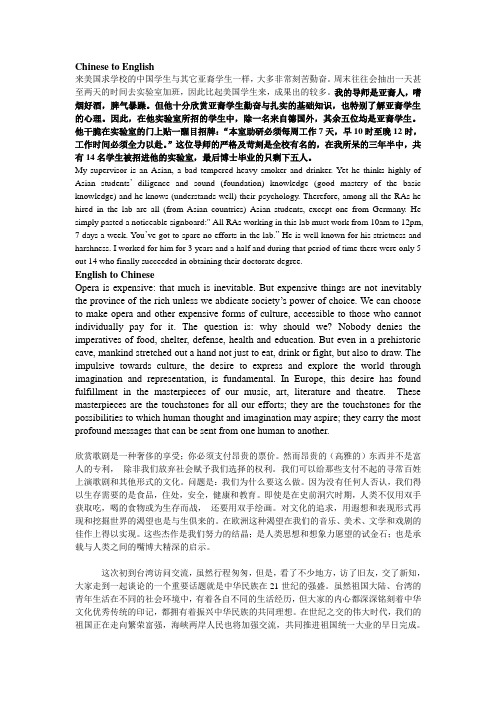
Chinese to English来美国求学校的中国学生与其它亚裔学生一样,大多非常刻苦勤奋。
周末往往会抽出一天甚至两天的时间去实验室加班,因此比起美国学生来,成果出的较多。
我的导师是亚裔人,嗜烟好酒,脾气暴躁。
但他十分欣赏亚裔学生勤奋与扎实的基础知识,也特别了解亚裔学生的心理。
因此,在他实验室所招的学生中,除一名来自德国外,其余五位均是亚裔学生。
他干脆在实验室的门上贴一醒目招牌:“本室助研必须每周工作7天,早10时至晚12时,工作时间必须全力以赴。
”这位导师的严格及苛刻是全校有名的,在我所呆的三年半中,共有14名学生被招进他的实验室,最后博士毕业的只剩下五人。
My supervisor is an Asian, a bad tempered heavy smoker and drinker. Yet he thinks highly of Asian students’diligence and sound (foundation) knowledge (good mastery of the basic knowledge) and he knows (understands well) their psychology. Therefore, among all the RAs he hired in the lab are all (from Asian countries) Asian students, except one from Germany. He simply pasted a noticeable signboard:" All RAs working in this lab must work from 10am to 12pm, 7 days a week. You’ve got to spare no efforts in the lab.” He is well known for his strictness and harshness. I worked for him for 3 years and a half and during that period of time there were only 5 out 14 who finally succeeded in obtaining their doctorate degree.English to ChineseOpera is expensive: that much is inevitable. But expensive things are not inevitably the province of the rich unless we abdicate society’s power of choice. We can choose to make opera and other expensive forms of culture, accessible to those who cannot individually pay for it. The question is: why should we? Nobody denies the imperatives of food, shelter, defense, health and education. But even in a prehistoric cave, mankind stretched out a hand not just to eat, drink or fight, but also to draw. The impulsive towards culture, the desire to express and explore the world through imagination and representation, is fundamental. In Europe, this desire has found fulfillment in the masterpieces of our music, art, literature and theatre. These masterpieces are the touchstones for all our efforts; they are the touchstones for the possibilities to which human thought and imagination may aspire; they carry the most profound messages that can be sent from one human to another.欣赏歌剧是一种奢侈的享受;你必须支付昂贵的票价。
英语专八翻译试题及答案
英语专八翻译试题及答案一、翻译试题(英译汉)原文:In the past few decades, the rapid development of technology has brought about significant changes to our lives. The advent of the internet and smartphones has transformed the way we communicate, work, and learn. However, this progress has also led to some unintended consequences, such as the decline in face-to-face interactions and the proliferation of misinformation.要求:1. 将上述英文原文翻译成中文。
2. 翻译应准确、流畅,符合汉语表达习惯。
3. 注意保持原文的语境和语义。
二、翻译试题(汉译英)原文:随着全球化的深入发展,跨国公司在世界经济中扮演着越来越重要的角色。
它们不仅促进了国际贸易和投资,还推动了技术交流和文化交流。
要求:1. 将上述中文原文翻译成英文。
2. 翻译应准确、自然,符合英语表达习惯。
3. 注意使用恰当的词汇和句式。
三、参考答案(一)英译汉参考答案:在过去的几十年里,科技的快速发展给我们的生活带来了显著的变化。
互联网和智能手机的出现改变了我们的交流、工作和学习方式。
然而,这种进步也导致了一些意料之外的后果,比如面对面交流的减少和错误信息的泛滥。
(二)汉译英参考答案:With the deepening development of globalization,multinational companies are playing an increasingly important role in the world economy. They not only promoteinternational trade and investment but also drive the exchange of technology and culture.四、评分标准1. 翻译准确性:译文应忠实原文,不得有遗漏或添加。
专八翻译_108散文篇章_精选
专八翻译_108散文篇章_精选第一部分汉译英1. 丑石(An Ugly Stone)2. 匆匆(Rush)3. 冬夜(Winter Night)4. 互助(Helping Each Other)5. 黄昏(Dusk)6. 盼头(Something to Lookl Forward to)7. 媲美(Beauty)8. 枪口(The Muzzles)9. 鸲鹆(The Story of a Myna) 10. 铜镜(The Bronze Mirror) 11. 学校(The College)12. 野草(Wild Grass)13. 种梨(Planting a Pear Tree) 14. 哀互生(Mourning for Husheng) 15.落花生(The Peanut)16. 盲演员(A Blind Actor)17. “孺子马” (An”Obedient Horse”)18. 小麻雀(A Little Sparrow) 19. 雄辩症(A Case of Eloquence) 20. 大钱饺子(A Good-luck Dumpling) 21. 荷塘月色(Moonlight over the Lotus Pond)22. 黄龙奇观(A View of Huangllong)23. 枯叶蝴蝶(Lappet Butterfies)24. 泡菜坛子(A pickle Pot)25. 田水哗啦(The Irrigation Water Came Gurgling) 26. 我若为王(If IBe King)27. 西式幽默(Western Humour)28. 项脊轩志(Xiangjixuan)29. 夜间来客(A Night Visitor——A True Story abouta ”Celebrity”Being Interviewed)30. 珍禽血雉(China‘s Native Pheasant)31. 常胜的歌手(A Singer Who Always Wins) 32. 健忘的画眉(The Forgetful Song Thrush) 33. 可爱的南京(Nanjing the Beloved City) 34. 鲁迅先生记(In Memory of Mr.Lu Xun)35. 苗族龙船节(The Miao Drangon-Boat Festival) 36. 秋天的怀念(Fond Memories of You)37. 献你一束花(A Bouquet of Flowers for you) 38. 鸭巢围的夜(A Night at Mallard-Nest Village) 39. 玫瑰色的月亮(The Rosy Moon)40. 内画壶《百子图》(Snuff Bottles with Pictures Inside) 41. 维护团结的人(A Man Upholding Unity)42. 我有一个志愿(I Have a Dream)43. 运动员的情操(Sportsmen‘s Values)44. 神话世界九寨沟(Jiuzhaigou,China‘s Fairyland)45. 生命的三分之一(One Third of Our Lifetime)46. 我可能是天津人(I Might Have Come from Tianjin) 47. 五台名刹画沧桑(The famous Monastery Witnesses Vicissitudes) 48. 爱梦想的羞怯女孩(A Shy Dreamer)49. 永久的憧憬和追求(My Lnging and yearning)50. 老人和他的三个儿子(The Old Man and his three sons) 51. 乐山龙舟会多姿多彩(dragon-Boat Festival at Leshan) 52. 撷自那片芳洲的清供(AnOffering from his Sweet homeland) 53. 三峡多奇景妙笔夺开工(The Scenic Three Gorges Captured ) 54. 初中国旅游可到哪些地斱(Tips on Traveling to China the First Time)第二部分英译汉1. A Ball to Roll Around(滚球)2. A Boupquet for Miss Benson(送给卞老师的一束花)3. A Boy and His Father Become Partners(父子伙伴情)4. A Gift of Dreams(梦寐以求的礼物)5. A Hard Day in the Kitchen(厨房里的一场闹刷)6. A Nation of Hypochondriacs(一个疑病症患者的国度)7. Are Books an Endangered Species? (书籍是即将灭绝的物种吗?)8. A Sailor‘s Christmas Gift(一个海员的圣诞礼物)9. A Tale of Two Smut Merchants(两上淫秽照片商的故事)10. A Visit with the Folks(探访故亲)11. Canadian Eskimo Lithographs(加拿大爱斯基摩人的石版画) 12. Divorce and Kids(离婚不孩子)13. Doug Heir(杜格?埃厄)14. Fame(声誉)s Journey(费利西娅的旅行) 15. Felicia‘16. Genius Sacrificed for failure(为育庸才损英才) 17. Glories of the Storm(辉煌壮丽的暴风雨) 18. Han Suyin‘s China(韩素音笔下的中国) 19. Hate(仇恨)20. How Should One Read a Book? (怎样读书?) 21. In Praie of the Humble Comma(小小逗号赞) 22. Integrity——From A Mother in Mannville(正直) 23. In the Pursuit of a Haunting and Timeless Truth(追寻一段永世难忘的叱实)24. Killer on Wings is Under Threat(飞翔的杀手正受到威胁) 25. Lifein a Violin Case(琴匣子中的生趣)26. Love Is Not like Merchandise(爱情不是商品) 27. Luck(好运气)28. Mayhew(生活的道路)29. My Averae Uncle(艾默大叔——一个普普通通的人) 30. My Father‘s Music(我父亲的音乐)31. My Mother‘s Gift (母亲的礼物)32. New Light Buld Offers Energy Efficiency(新型灯泡提高能效) 33. Of Studies(谈读书)34. On Leadership(论领导)35. On Cottages in General(农舍概述)36. Over the Hill(开小差)37. Promise of Bluebirds(蓝知更鸟的希望)38. Stories on a Headboard(床头板上故事多)39. Sunday(星期天)40. The Blanket(一条毛毯)41. The Colour of the Sky(天空的色彩)42. The date Father Didn‘t Keep(父亲失约)43. The Kiss(吻)) 44. The Letter(家书45. The Little Boat That Sailed through Time(悠悠岁月小船情) 46. The Living Seas(富有生命的海洋)47. The Roots of My Ambition(我的自强之源)48. The song of the River(河之歌)49. They Wanted Him Everywhere——Herbert von Karajan(1908-1989) (哪儿都要他)50. Three Great Puffy Rolls(三个又大双暄的面包圈) 51. Trust(信任)52. Why measure Life in Hearbeats? (何必以心跳定生死?)53. Why the bones Break(骨折缘何而起)54. Why Women Live Longer than Men(为什么女人经男人活得长)丑石 An Ugly Stone贾平凹 Jia Pingwa我常常遗憾我家门前的那块丑石呢:它I used to feel sorry for that ugly 黑黝黝地卧在那里,牛似的模样;谁也不知black piece of stone lying like an 道是什么时候留在这里的.谁也不去理会它。
专八翻译英译汉
The bird,however hard the frost may be,flies briskly to his customary roosting-place,and,with beak tucked into his wing,falls asleep.尽管天气是如此的寒冷,鸟儿还是矫捷地飞上一惯栖息的地方,把喙埋在翅膀下面,慢慢沉入梦乡He has no apprehensions;only the hot blood grows colder and colder,the pulse feebler as he sleeps,and at midnight,or in the early morning,he drops from his perch---death.它没有丝毫的恐惧;睡梦中,只有滚烫的血液变得越来越冷;有力的脉搏也越来越微弱.在深夜或者第二天一大早,它便从栖身的考(试^大树枝上跌落下来,死掉了。
Y esterday he lived and moved,responsive to a thousand external influences,昨天它还活蹦乱跳,回应外界无数刺激。
reflecting earth and sky in his small brilliant brain as in a looking-glass;also he had a various language,the inherited knowledge of his race,the faculty of flight,by means of which he could shoot,meteor-like,across the sky,and pass swiftly from place to place;它那奇异的小脑袋宛如明镜一般,映照着天地;它还会种种不同的语言,这是它们种族遗传下来的知识;还有飞行的技能,凭此它能流星般划过天空,迅速地从一个地方飞到另一个地方;and with it such perfect control over all his organs,such marvelous certitude in all his motions,as to be able to drop himself plumb down from the tallest tree-top,or out of the void air,on to a slender spray,and scarcely cause its leaves to tremble.它能如此完美地控制每一个器官,且每个动作都如此惊人地平稳,以致于它可以从最高的树顶垂直飞下,从空旷的空中飞落到细小的树枝上而几乎不让树叶抖动Now,on this morning,he lies stiff and motionless;if you were to take him up and drop him from your hand,he would fall to the ground like a stone or a lump of clay-而现在,在这个清晨,它僵硬地躺在那儿,一动不动;假如你把它捡起来,抛向空中,它就会像石头或者泥巴那样掉落在地------so easy and swift is the passage from life to death in wild nature!But he was never miserable在野生自然界中,由生到死是多么容易多么迅速的一个过程呀!但那鸟却永远不会觉得悲痛。
专八翻译词汇
大男子主义male chauvinism非物质文化遗产intangible cultural heritage珍稀动物rare animals产品科技含量technological element of a product长江三角洲:Yangtze River delta长江中下游:the middle and lower reaches of Changjiang River超前消费:pre-mature consumption城镇居民最低生活保障:a minimum standard of living for residents城镇职工医疗保险制度:the system of medical insurance for urban workers重复建设:building redundant project; duplication of similar projects充值卡:rechargeable card春运:passenger transport around the Chinese lunar new year打破僵局:break the deadlock/stalemate控股公司holding company; controlling company; parent company跨国公司/集团/企业multinational corporation/group/enterprise会计事务所public accounting firm劳动密集型工业labor-intensive industry立交桥flyover; overpass“2002中国”旅游年“Visit China’2002”贸易往来trade contracts; commercial intercourse美容美发中心beauty salon企业兼并和联合the merger and association of enterprises人均国民收入per capita national income人均国民生产总值达中等发达国家水平an average per capita GNP up to the standard of medium-developed countries实践是检验真理的唯一标准practice is the sole criterion for judging truth投资环境investment environment外资企业foreign-funded enterprises温饱问题the people’s basic need for food and clothing物价指数price-rise index“希望工程”、“青年志愿者”和“手拉手”活动activities like the “Hope Project”, “Young V olunteers”and “Hand in Hand”香港特别行政区Hong Kong Special Administrative Region(HKSAR) 香港特别行政区长官the chief Executive of the HKSAR消费者协会consumer association消费者权益consumer’s rights and interests小康生活living a relatively comfortable life(发展是)“硬道理”development is the most essential criterion职业道德occupational ethics; professional ethics职业道德规范norms of occupational ethics综合国力comprehensive national strength; the overall strength of the country自尊、自信、自强的民族精神the national spirit of self-respect, self-confidence and self-support不附带任何条件be accompanied by no conditions;with nostrings attached和平共处coexist peacefully民族自尊心national dignity一贯主张constantly state国际局势international situation经济差距economic gap不利于not contribute to对内开放和对外开放to open up both externally and internally战略目标strategic goal加强与……的合作strengthen exchanges and co-operation in有潜能have potential共同努力jointly work hard for能量power ,energy“温室效应”“green-house effect”土地沙漠化desertification生态恶化deterioration of the ecology酸雨acid rain提高人们的环境意识raise people’s awareness of the environment 保护生态环境environmental protection罕见的rare吃饭穿衣food and clothing保持丰收gain a good harvest增加农业投入invest more in agriculture可行性研究报告feasibility study report可视电话video telephone中国的国情China’s own conditions人力资源manpower, human resources资金不足short of funds围绕focus on经济效率economic efficiency降低生产成本lower production cost生产力productive forces劳动生产率labor productivity巨大发展have made a big advance技术转让technology transfer对待treat改善improve认真执行faithfully implement中外合资企业joint ventures现有企业existing enterprises独立自主independence自力更生self-reliance对…有利beneficial to加强strengthen实行implement, carry out货物goods鸦片战争The Opium War连续十年for ten years running衡量measure, evaluate财政资助financial support高等学校institutions of higher education高等教育higher education初等教育elementary education secondary schools 山区mountain areas发电produce electricity取代replace主张hold ,state共同管理jointly manage一律平等be all equal牟取任何暴利seek excessive profits灵活的flexible领导和组织guide and organize充分发挥……积极性bring one’s initiative into full play 普遍规律general law“星火”计划“spark”program广大农村vast rural areas推广spread把……应用于生产apply…to production第三世界the third world维护民族独立defend national independence国家主权state sovereignty政治独立political independence巩固back up, consolidate苦难经历hard experience , sufferings实践practice改造transformation长时间闭关锁国be closed and self-fettered for a long time 境况circumstances必然结论inevitable solution争取外援win foreign aid闭关自守Closed-door policy资本capital项目items / projects冒险的成分element of risk承担风险bear (take) the risk of…世界银行The World Bank计算方法method of calculation估算estimate局限性limitation经济结构economic structure指示说明instruction, direction追求眼前利益pursue one’s short-term interests原料raw materials重工业heavy industry装配和修理assemble and repair大型large-sized中型medium-sized小型small-sized合理的发展rationally developed长处strong points短处weak points各级政府government at all levels各行各业的人们people from all trades and professions 祖先ancestors长江流域Yangtze river basins长江三峡the Three Gorges of Yangtze River人才外流brain drain急需need badly缺乏lack, be short of投资环境environment for investment集中力量concentrate on鼓励encourage技术改造technological transformation进口货物imported goods进口或出口import or export创收外汇earn foreign exchange (currency)竞争competition厂商manufacturers活跃市场enliven the market逐步建立gradually establish造成损失cause a loss to…被列为be listed as全国人民代表大会the National People’s Congress制定……的法律make a law of (to)…十分重视attach great importance to基本国策fundamental national policies大力发展strive to develop社区服务community service社会福利事业social welfare system高层建筑high-rising buildings住房建设housing construction不吸烟者nonsmokers从长远的观点看in the long run古代中国ancient China改进教和学improve teaching and learning按分数according to the grades传真机fax machines个体经营者self-employed businessmen工作安排work arrangement电子邮件electric mail工作场所working place总产值general output of跟上时代的步伐keep pace with the times获取知识的重要渠道an important channel to acquire knowledge 每隔一段时间at short intervals进餐习俗eating customs落后backward外语能力foreign language ability恢复restore获得acquire, master统一考试unified test培养train, cultivate外语中学foreign language school地区性的regional读写困难difficulties in reading and writing就业机会opportunities for employment受过良好教育well-educated未受教育uneducated遗憾的是It is a pity that…造成了困难cause some difficulties财富 a treasure to高等院校institutions of higher learning/education准时be punctual私人开办的公司privately owned companies公共卫生public health机关集体government and social institutions增强妇女的参政意识enhance women’s awareness of political participation取暖heating太阳能solar energy信息information全国性nation-wide信息网络information network承担take over功能function体力劳动physical labor代价太高high cost宇宙飞行space flight新的发现discoveries与日俱增increase every day国际经济秩序global economic order妨碍hinder统计数学statistics乡镇企业township enterprise生活质量the quality of life偏远地区remote areas文化素质cultural qualities推动give a push to促进promote进步progress, advance唐代Tang Dynasty概念concept“安全岛”pedestrian island按国际惯例according to the international practices保护知识产权to protect intellectual property (right)成人教育和职业教育adult education and job training (vocational education)惩治腐败to combat corruption第三产业the service sector;tertiary industry多极化趋势the trends towards multi-polarity改革开放政策the policies of reform and open-up(opening-up)岗位培训和就业技能培训pre-job and on-the-job training高新技术产业开发区new and high-tech industrial development zone合法权益lawful rights and interests宏观经济模式macro-economic mode后起之秀promising young people黄色出版物和非法出版活动pornographic publications and illegal publishing practices基础设施、基础工业和支柱产业infrastructure, basic industries and pillar industries 集装箱运输container traffic假冒伪劣商品和牟取暴利的行为fake and poor quality commodities and the making of exorbitant profits健身房gymnasium; fitness center精品店boutique经济技术开发区economic and technological development zone (ETDZ)经济特区special economic zone (SEZ)就业培训vocational training or employment科学工业园区science-based industrial park科教兴国战略和可持续发展战略the strategies for revitalizing the nationthrough science and education and sustainable development科技成果转化为生产力to translate the results of scientific research into productive force服务行业:catering industry复合型人才:inter-disciplinary talent岗位培训:on-the-job training高等教育自学考试:self-study higher education examination高新技术产业开发区:high and new technological industrial development zone各大菜系:major styles of cooking各行各业:every walk of life功夫不负有心人:Everything comes to him who waits各尽其能:let each person do his best公益活动:public welfare activities把握大局:grasp the overall situation摆谱儿:put on airs; keep up appearances白手起家: start from scratch拜年:pay New Year call班门弄斧:teach one's grandma to suck eggs报销:apply for reimbursement爆冷门:produce an unexpected answer曝光:make public奔小康:strive for a relatively comfortable life闭门羹:given cold-shoulder比上不足,比下有余:fall short of the best, but be better than the worst逼上梁山:be driven to drastic alternatives变相涨价:disguised inflation边远贫困地区:outlying poverty-stricken areas边缘知识人:Marginal intellectuals表面文章:Lip service; surface formality博导:Ph.D supervisor补发拖欠的养脑筋:Clear up pension payments in arrears不眠之夜:white night菜鸟:green hand电脑盲:computer illiterate点球:penalty kick电视会议:video conference电视直销:TV home shopping定向培训:training for specific posts动感电影:multidimensional movie豆腐渣工程:jerry-built projects对...毫无顾忌:make no bones about夺冠:take the crown政治多元化:political pluralism工薪阶层:state employee; salaried person过犹不及:going too far ia as bad as not going far enough函授大学:correspondence university好莱坞大片:Hollywood blockbuster核心竞争力:core competitiveness虎父无犬子:A wise goose never lays a tame egg基本国情:fundamental realities of the country激烈竞争:cut-throat competition极限运动:maximal exercise/X-games集中精力把经济建设搞上去:go all out for economic development 加班:work extra shifts嘉宾:distinguished/honored guest加快市场步伐:quicken the pace of marketization假冒伪劣产品:counterfeit and shoddy products减负:alleviate burdens on sb江南水乡:the south of the lower reaches of the Yangtze River教书育人:impart knowledge and educate people脚踏实地:be down-to-earth解除劳动关系:sever labor relations扩大内需:expand domestic demand。
- 1、下载文档前请自行甄别文档内容的完整性,平台不提供额外的编辑、内容补充、找答案等附加服务。
- 2、"仅部分预览"的文档,不可在线预览部分如存在完整性等问题,可反馈申请退款(可完整预览的文档不适用该条件!)。
- 3、如文档侵犯您的权益,请联系客服反馈,我们会尽快为您处理(人工客服工作时间:9:00-18:30)。
当我在小学毕了业的时候,亲友一致的愿意我去学手艺,好帮助母亲。
我晓得我应当去找饭吃,以减轻母亲的勤劳困苦。
可是,我也愿意升学。
我偷偷的考入了师范学校——制服,饭食,书籍,宿处,都由学校供给。
只有这样,我才敢对母亲说升学的话。
入学,要交十元的保证金。
这是一笔巨款!母亲作了半个月的难,把这巨款筹到,而后含泪把我送出门去。
她不辞劳苦,只要儿子有出息。
当我由师范毕业,而被派为小学校校长,母亲与我都一夜不曾合眼。
我只说了句:“以后,您可以歇一歇了!”她的回答只有一串串的眼泪。
The physical distance between speakers can indicate a number of things and can also be used to consciously send messages about intent. Closeness, for example, indicates intimacy or threat to many speakers whilst distance may denote formality or a lack of interest. Proximity is also both a matter of personal style and is often culture-bound so that what may seem normal to a speaker from one culture may appear unnecessarily close or distant to a speaker from another. And standing close to someone may be quite appropriate in some situations such as an informal party, but completely out of place in others, such as meeting with a superior.
Posture can convey meaning too. Hunched shoulders and a hanging head give a powerful indication of mood. A lowered head when speaking to a superior (with or without eye contact) can convey the appropriate relationship in some cultures.。
